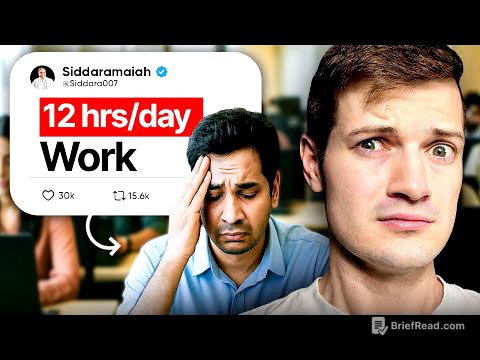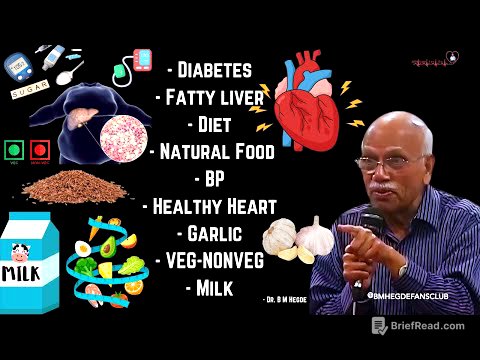Brief Summary
Alright, so, this whole seminar by Brian Tracy, na, it's all about the psychology of achievement, ya. He's breaking down why some people just seem to kill it in life while others are struggling, no? Basically, success is predictable if you follow certain principles. Here's the gist:
- Decide you want to be super successful, like, really commit.
- Learn the rules of the game, the mental laws that govern success.
- Focus on peace of mind, health, good relationships, financial freedom, worthy goals, self-knowledge, and feeling fulfilled.
- Understand your mind, how your thoughts drive your reality.
- Take charge, be responsible, and ditch those negative emotions holding you back.
Introduction to the Psychology of Achievement
Brian Tracy introduces the seminar, promising that success is predictable like the sunrise. He emphasizes two key actions: deciding to exceed previous accomplishments and learning how. The seminar aims to provide a "blank check on the future" by teaching principles from various fields, that can dramatically improve results. He dispels common myths like needing high intelligence, luck, or connections, asserting that success is based on other factors. He also highlights the human "success instinct," driving us to achieve and fulfill our potential.
Seven Ingredients of Success
Success, according to Brian, has seven key ingredients. First, peace of mind, which is freedom from fear, stress, and negative emotions. Second, health and energy, which are closely linked to peace of mind. Third, loving relationships, because the quality of your relationships determines the quality of your life. Fourth, financial freedom, which is having enough money so you don't worry about it. Fifth, worthy goals and ideals, which give you meaning and purpose. Sixth, self-knowledge and self-understanding, which means knowing who you are and why you do what you do. And seventh, personal fulfillment, which is the feeling that you are becoming everything you are capable of becoming.
Understanding the Formula for Success
Brian talks about how most people function far below their potential, often due to the lack of an "instruction manual" for success. He introduces a formula: Understanding multiplied by Effort equals Results. The seminar aims to boost both understanding and effort, leading to dramatic improvements. He assures that the principles taught are universally applicable and can lead to significant progress in a short time.
Seven Mental Laws
Brian says that you are unique, but also subject to mental laws. The first law is the law of control: you feel good to the degree you feel in control. Control starts with your thoughts, which influence your feelings and actions. The opposite is the law of accident: failing to plan is planning to fail. Most people live by this, drifting without clear goals. Then there's the law of cause and effect: for every effect, there's a cause. Thoughts are causes, and conditions are effects. The law of belief: whatever you believe with feeling becomes your reality. He shares a story about a student whose grades changed when he realized his test score was a percentile, not an IQ score.
More Mental Laws: Expectations, Attraction, and Correspondence
Brian talks about the law of expectations: what you expect, you get. He shares an experiment where teachers were told certain students were bright, and those students excelled, regardless of their actual IQ. Expectations from parents, bosses, and yourself are powerful. He suggests starting each day by saying, "I believe something wonderful is going to happen to me today." Then there's the law of attraction: you attract people and circumstances in harmony with your dominant thoughts. Keep your thoughts on what you want, not what you don't. Finally, the law of correspondence: your outer world mirrors your inner world. Change your thinking, and you change your life.
Unlocking Your Potential: Self-Concept
Brian talks about unlocking your potential. He introduces a formula: Inborn Attributes plus Acquired Attributes, multiplied by Attitude, equals Individual Human Potential. Attitude is key and comes from expectations, beliefs, and values. He introduces the self-concept: a bundle of beliefs that determines your effectiveness. The self-concept has three parts: the self-ideal (who you want to be), the self-image (how you see yourself), and self-esteem (how you feel about yourself). He emphasizes that you can never earn more than 10% above or below your self-concept level of income.
Childhood Conditioning and Negative Habit Patterns
Brian talks about where self-esteem comes from. Children are born with no fears and are completely spontaneous. They learn by imitation and moving toward comfort. Negative habit patterns develop from destructive criticism, leading to two major manifestations: the inhibitive (fear of failure) and the compulsive (fear of rejection). He explains how these fears manifest physically. He says that you can unlearn these habits by working on your self-esteem.
The Conscious and Subconscious Minds
Brian talks about the conscious and subconscious minds. The conscious mind is objective, rational, and discriminating, handling about 10% of your thinking. It identifies, compares, analyzes, and decides. The subconscious mind is a massive data bank, storing and retrieving data, and functions at 30,000 times the speed of the conscious mind. He introduces three mental laws: the law of subconscious activity (whatever you plant in your subconscious, it brings into reality), the law of concentration (whatever you dwell upon grows), and the law of substitution (replace negative thoughts with positive ones).
Taking Charge of Your Life: Responsibility
Brian talks about taking charge of your life. He emphasizes self-responsibility: you are the architect of your own destiny. From age 18 onward, you are 100% responsible. The slogan of the responsible person is, "If it's to be, it's up to me." He contrasts maturity with immaturity, explaining that many people get stuck in the "valley of excuses." He emphasizes that the acceptance of responsibility is not optional. He introduces the challenge-response theory: civilizations grow to the degree they meet challenges effectively.
Eliminating Negative Emotions
Brian talks about eliminating negative emotions. He says there's a one-to-one relationship between responsibility, control, freedom, and positive emotions. Irresponsibility leads to a lack of control, freedom, and negative emotions. He introduces the "negative emotion tree," with roots of justification and identification, and fruit of fear, doubt, hate, envy, resentment, and guilt, all boiling down to anger. The trunk of the tree is blame. To eliminate negative emotions, become non-judgmental, disidentify, and stop blaming.
Releasing Your Brakes: Overcoming Negative Habit Patterns
Brian talks about releasing your brakes. He emphasizes that you can't advance without getting rid of negative emotions. Negative habit patterns have roots in destructive criticism. He discusses the inhibitive (fear of failure) and compulsive (fear of rejection) negative habit patterns. He says that you can unlearn these habits by working on your self-esteem. He offers advice on how to give constructive criticism, focusing on praise, protecting self-esteem, discussing performance, and focusing on the future.
Your Subconscious Powerhouse
Brian talks about the conscious and subconscious minds. The conscious mind is objective, rational, and discriminating, handling about 10% of your thinking. It identifies, compares, analyzes, and decides. The subconscious mind is a massive data bank, storing and retrieving data, and functions at 30,000 times the speed of the conscious mind. He introduces three mental laws: the law of subconscious activity (whatever you plant in your subconscious, it brings into reality), the law of concentration (whatever you dwell upon grows), and the law of substitution (replace negative thoughts with positive ones).
Programming Your Mind for Success
Brian talks about programming your mind for success. He emphasizes that you become what you think about. He introduces the self-concept: a bundle of beliefs that determines your effectiveness. He emphasizes that you can never earn more than 10% above or below your self-concept level of income. He introduces the law of subconscious activity, the law of concentration, and the law of substitution. He emphasizes taking purposeful, systematic control of the content of your conscious mind.
Software for the Brain: Mental Programming Techniques
Brian talks about software for the brain. He introduces mental programming techniques to speed up the process of internal change. The first is the written programming technique: rewrite your major goals every morning. Then, close your eyes, visualize your goals as accomplished, and imagine the feeling of pleasure. He introduces the law of relaxation: in mental working, effort defeats itself. The second technique is quick programming: visualize the perfect outcome, affirm it, emotionalize it, and release it. This is based on mental rehearsal: recalling and reliving excellence.
Rapid Learning Techniques
Brian talks about rapid learning techniques. He emphasizes that intelligence is a way of acting, not just IQ. He says that learning ability is malleable and that if you want to earn more, you have to learn more. He introduces the work of Georgi Lozanov, who developed accelerated learning techniques using music and relaxation. He shares the results of Lozanov's experiments, where students learned hundreds or even thousands of words in a single day with high retention.
Progressive Relaxation with Music
Brian talks about progressive relaxation with music. He explains that if you can learn a language quickly with relaxation and music, you can also learn new belief systems. He discusses meditation and Transcendental Meditation. He emphasizes that you can improve your self-esteem by repeating, "I like myself." He introduces taped affirmation: putting your goals on a tape with music and playing it in a relaxed state. He explains the key elements: progressive relaxation, heterogenic conditioning (using "you" in affirmations), health, relaxation, twice-daily use, relaxing music, and assuming the position.
Five Keys to Goal Setting
Brian talks about five keys to goal setting. He emphasizes that success is goals, and all else is commentary. He shares a study showing that only 3% of people have clear, specific, written goals. He emphasizes that the ability to set goals is the master skill of success. He explains that achieving goals is automatic, but the problem is that people don't set goals. He discusses four reasons why people don't set goals: they don't realize the importance, they don't know how, fear of rejection, and fear of failure.
Twelve Steps to Goal Achieving
Brian talks about 12 steps to goal achieving. The first is desire: the more intense, the better. The second is belief: make your goals believable. The third is write it down: make it concrete. The fourth is ask yourself why you want it: reasons are the fuel in the furnace of achievement. The fifth is analyze your starting point: what are your strengths and weaknesses? The sixth is set a deadline and establish a reward schedule. The seventh is identify the obstacles you'll have to overcome. The eighth is identify the knowledge you'll require. The ninth is identify your customer. The tenth is make a plan. The eleventh is visualization. The twelfth is back your plan with determination and persistence.
Developing a Success Personality
Brian talks about developing a success personality. He emphasizes that your ability to get along with others is your most valuable asset. He shares measures of a healthy personality: how much you like yourself, how much responsibility you accept, how easily you forgive, and positive expectations. He introduces the law of indirect effort: you get what you want indirectly faster than directly. He emphasizes the importance of a positive mental attitude.
Building Superior Relationships
Brian talks about building superior relationships. He emphasizes that no success in public life can compensate for failure in the home. He shares six keys to successful relationships: similarities attract (especially in values), opposites attract (in temperament), commitment, similar self-concepts, liking (more important than being in love), and communication. He emphasizes that men are direct, and women are indirect. He shares advice on how to handle problems in relationships, such as lack of commitment, trying to change the other person, jealousy, self-pity, and incompatibility.
How to Raise Super Kids
Brian talks about how to raise super kids. He emphasizes that the role of parenting is to nurture children and build high self-esteem. He shares key ideas: never use destructive criticism, provide a continuous flow of love and approval, and tell your children you love them every day. He shares four behaviors to show love: unconditional love, eye contact, physical contact, and focused attention. He emphasizes the importance of forgiving your parents and giving children permission to remind you when you forget.
Finding True Purpose in Life
Brian talks about finding true purpose in life. He says that the true purpose of life is to find a mission that enriches and ennobles the lives of other people. He shares examples of people who have had a profound impact on mankind, such as Jesus, Buddha, and Mother Teresa. He emphasizes that you only become great to the degree you lose yourself in something bigger than yourself. He shares how to become a totally loving person: accept yourself unconditionally, accept total responsibility, learn to forgive, feed your mind with loving thoughts, set noble goals, take care of your body, and practice the Golden Rule.









